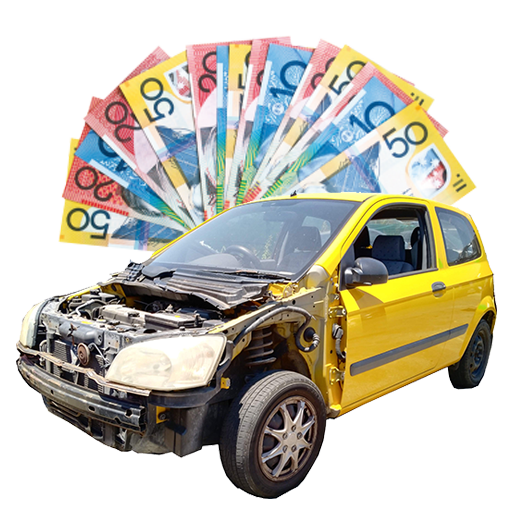So, you've got an old car taking up space and you're wondering what it's worth. In Australia, the answer usually lies somewhere between $300 and $900. The final price tag depends on a few key things: the car's size, its weight, and what kind of condition it's in.
Forget what it was worth as a roadworthy vehicle. When we talk about scrap, we're talking about the value of its raw materials, not its ability to get you from A to B.
What Is the Average Scrap Car Price in Australia
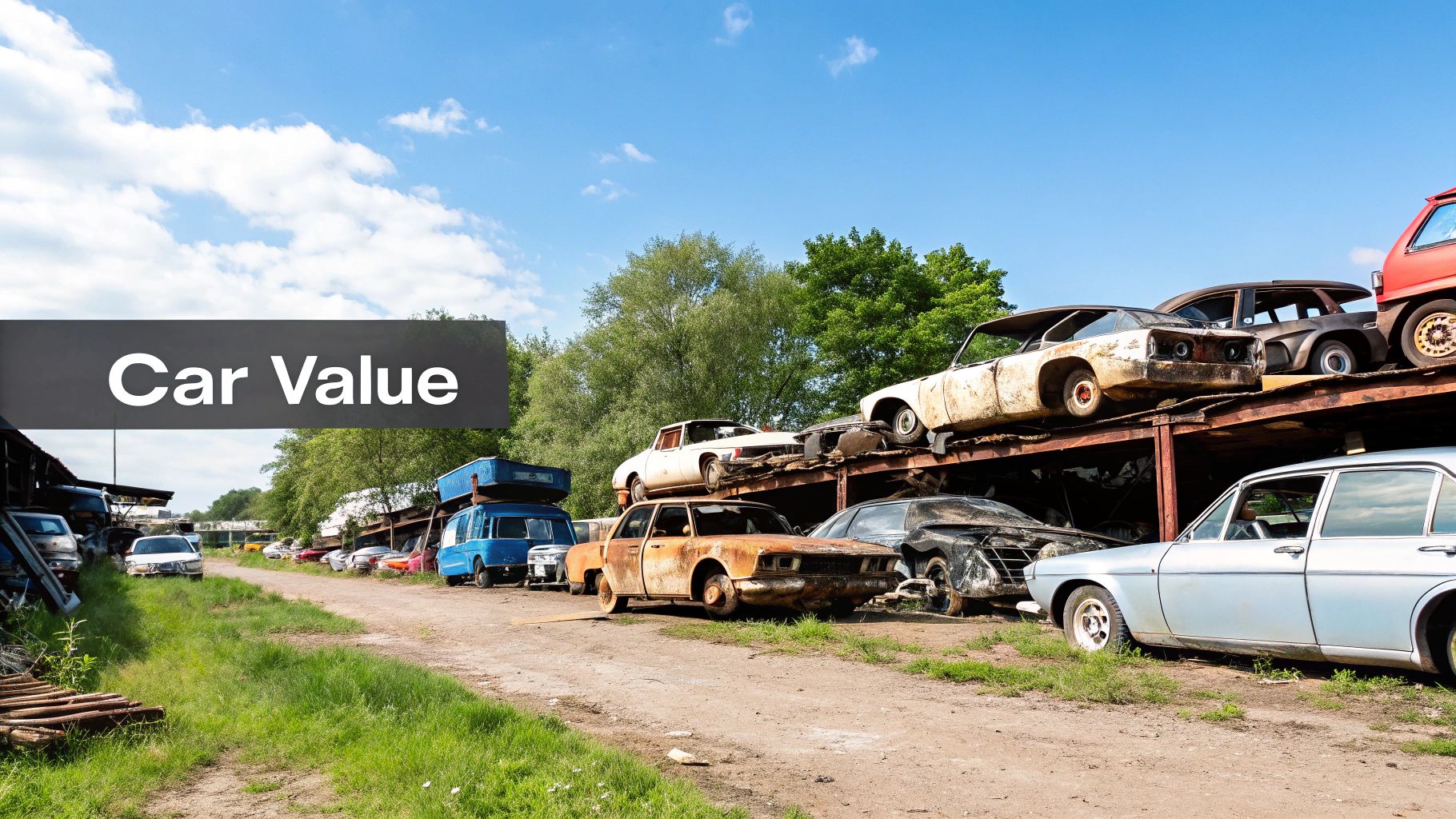
When it's time to part ways with an old clunker, the first question on everyone's mind is, "How much cash can I get for it?" Scrap car prices aren't just pulled out of thin air. They're calculated based on real, tangible factors—mostly the weight of the recyclable metals inside your vehicle. We’re talking about steel, aluminium, and copper.
Think of it this way: you're selling the car for its raw ingredients, not for its function as a finished product.
This baseline value helps set a realistic expectation right from the start. Of course, other variables can nudge your offer up, but the metal weight is the foundation. The best way to get a solid idea is to get a specific quote. You can use a free scrap car value calculator to get a quick estimate and see what your car might be worth right now.
Current Market Rates
Let's look at some recent numbers to get a clearer picture. According to industry data, the average scrap car price has been hovering around $521 AUD. This shows a pretty stable market, even with all the economic ups and downs we've seen.
Interestingly, the most common car hitting the scrap heap lately has been the Holden Cruze, which brought in an average of $625 AUD. It just goes to show how different models can fetch different prices.
A car's scrap value is a direct reflection of its raw materials. Heavier vehicles like SUVs and utes will almost always command a higher price than a small hatchback simply because they contain more metal.
To give you a clearer idea, here's a general breakdown of what you might expect based on your vehicle type.
Average Scrap Car Prices by Vehicle Type
| Vehicle Type | Typical Price Range (AUD) |
|---|---|
| Small Cars (e.g., Hatchbacks, Sedans) | $300 – $550 |
| Mid-Size Cars (e.g., Wagons, SUVs) | $500 – $750 |
| Large Vehicles (e.g., Utes, Vans) | $600 – $900+ |
As you can see, size and weight really do make the biggest difference. A hefty 4WD or a commercial van has a lot more valuable metal than a little city runabout, and the price reflects that.
Decoding What Determines Your Car's Scrap Value
Ever wondered why one old clunker gets a great price while another, seemingly similar car, gets a much lower offer? It’s not just random guesswork. The secret is in the car's raw ingredients, and the single biggest factor is its total weight.
Think of it this way: a scrap yard isn't buying your car to drive it; they're buying it for the metal it's made from. Steel is the main component, so a heavier car simply has more of it. It’s why a hefty old Holden Commodore or Ford Falcon will almost always have a higher starting value than a little Toyota Yaris.
The Core Valuation Factors
Beyond sheer weight, your car’s make, model, and age really do matter. Older cars might be missing some of the more valuable components found in modern vehicles. On the other hand, certain manufacturers were known for using a good amount of high-value metals like aluminium in their engines or frames. It’s this mix of factors that shapes the initial quote you receive.
If you're curious about the logic behind valuing a non-roadworthy car, it's interesting to see how total loss vehicle value is calculated by insurers, as some of the principles overlap.
This image breaks down the most important elements that influence your car's final price.
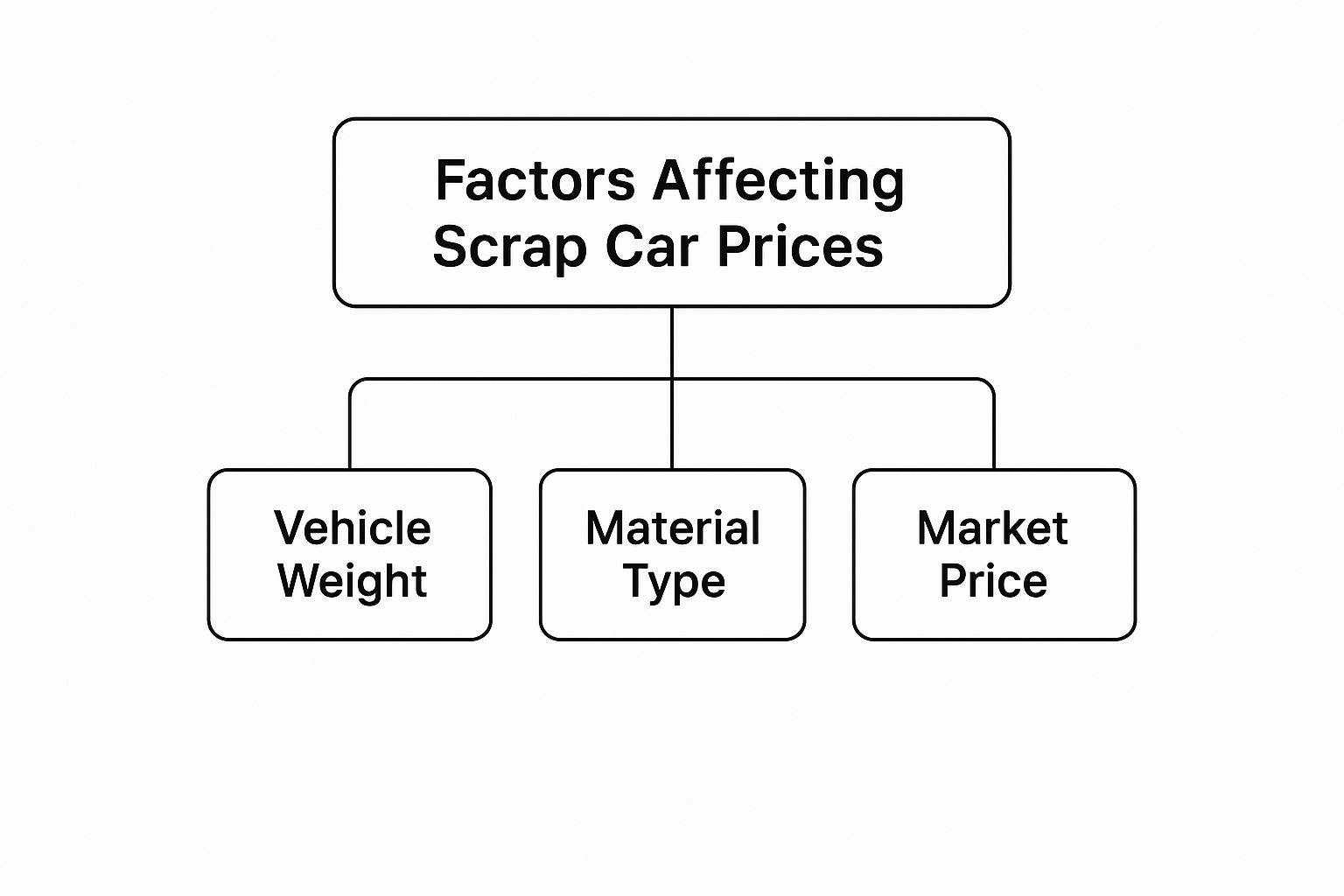
As you can see, the vehicle's weight and the specific metals it contains are the foundation of its value, which then gets tied to the daily market price for those raw materials.
Key Takeaway: Your car's scrap value has far more to do with its physical substance than its badge. A heavier car packed with desirable metals will always fetch a better price, whether it was a luxury sedan or a humble ute.
This method is pretty standard right across Australia. While the national average for a scrap car sits around $500 AUD, the prices can swing quite a bit. A small car might only bring in $200 to $300, whereas a big SUV or 4WD could easily pull in $450 to $600—all because of that extra metal.
You can dive deeper into how scrap car prices are determined by checking out our guide on scrap vehicle value.
How Global Metal Markets Affect Your Payout
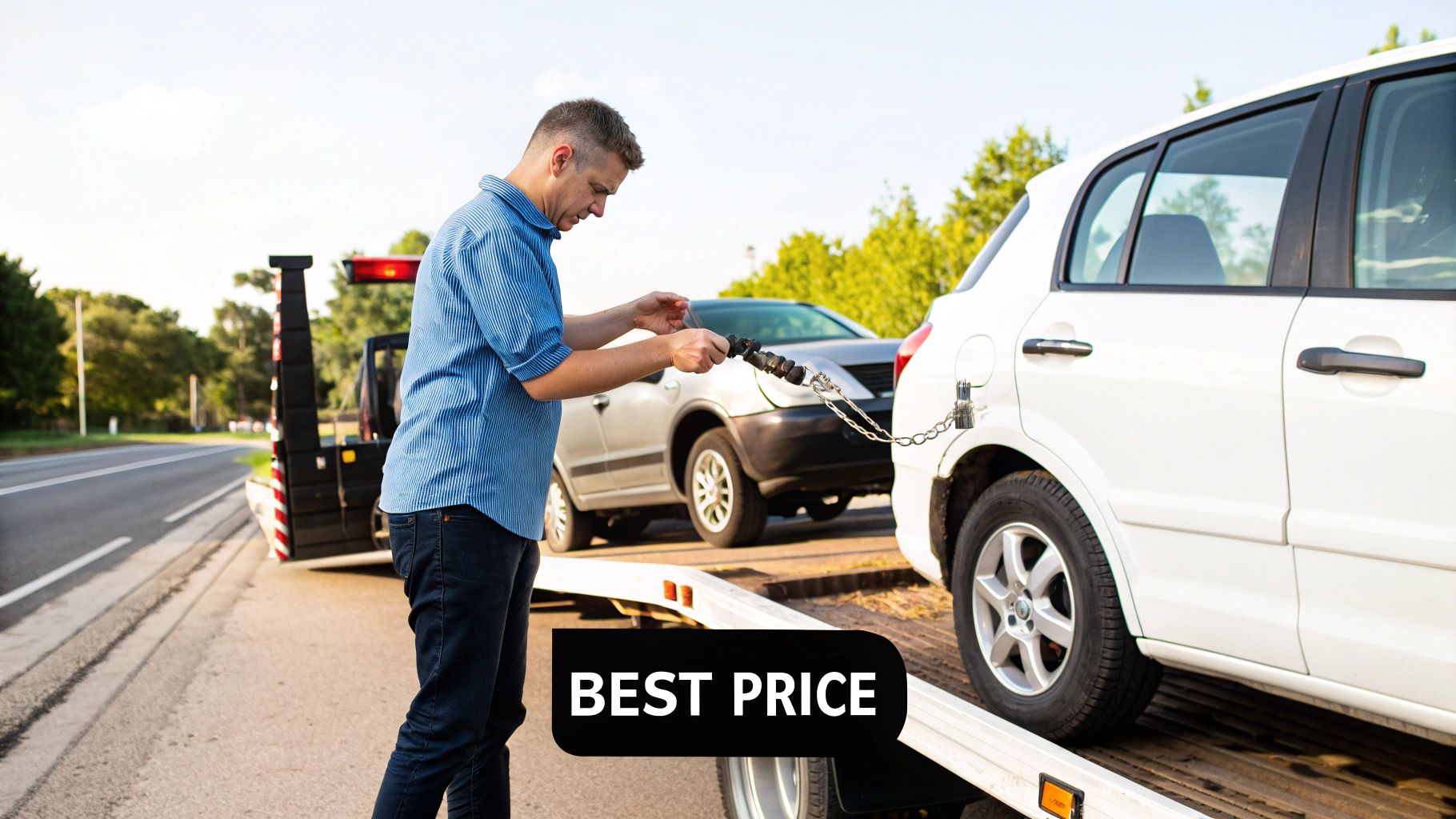
It might seem strange, but the cash you get for your old car in Adelaide is directly tied to economic forces halfway across the globe. It helps to think of scrap metal in the same way you’d think of other global commodities, like oil or even coffee beans. Its value is constantly shifting based on worldwide supply and demand.
So, when there’s a construction boom in Asia or European factories are churning out new cars, they need more recycled steel and aluminium. This spike in demand drives up the price, and that increased value eventually makes its way down to the quote you get from your local Adelaide scrap yard.
Of course, the opposite is also true. A slowdown in the global economy means less demand for metal, which can cause local scrap prices to dip. It’s a classic case of global economics playing out right in your driveway.
The London Metal Exchange Connection
So, who sets these global prices? A major player in this whole equation is the London Metal Exchange (LME). Essentially, it’s the world’s command centre for trading industrial metals. The LME sets the benchmark prices for steel, aluminium, and copper—the core ingredients of any car.
Scrap dealers here in Australia, and all over the world, keep a very close eye on the LME's daily figures. These numbers tell them what the raw materials they’re buying are actually worth on any given day. If steel prices are trending upwards on the LME, you can bet that the offers for scrap cars will rise too.
This is why a quote you get one month can be quite different from a quote you might get the next. It’s not arbitrary; it’s a direct reflection of a massive, interconnected global market. To see how these numbers translate locally, you can learn more about how scrap metal car prices are calculated based on these live market conditions.
Of course. Here is the rewritten section, designed to sound natural and human-written, as if from an experienced expert.
Where the Real Money Is: Parts and Proximity
The weight of your car in steel gives you a starting point for its scrap value, but that's just the beginning of the story. The two biggest factors that can really bump up your payout are the condition of its parts and where you're located. A car that's breathed its last on the road is often a goldmine of components for scrap buyers.
Think of it this way: the car as a whole might be done, but what about its heart and soul? The engine, the transmission, the catalytic converter—these could still be in great shape. These are high-demand items with a resale value that blows their simple scrap metal weight out of the water. Any decent buyer will see this potential and build it into their offer.
This is precisely why you might get wildly different quotes for two cars that weigh the same. One car might have a desirable engine or a mint-condition leather interior. These aren't just scrap; they're assets that can be pulled, cleaned up, and sold on. Suddenly, your old clunker isn't just a lump of metal—it's a collection of valuable, reusable parts.
Does Your Suburb Affect the Price?
Absolutely. How close you are to the scrap yard or recycling facility plays a massive role in what you'll be offered for your scrap car. It all comes down to simple logistics. The further they have to drive to pick up your car, the more it costs them in fuel, wages, and time. And you can bet those costs are factored into the price they quote you.
If you're in a major city like Adelaide, you're usually in a better position. The competition is fiercer, and the travel times are shorter, meaning yards can run a tighter ship. Often, they’ll pass a bit of that efficiency back to you in the form of a better offer.
Your postcode isn't just an address; it's a key variable in the scrap car price formula. Being closer to the action almost always means less money is shaved off for the buyer's transport costs, leaving more in your pocket.
You can see this play out in the market data. For example, scrap car prices in Western Australia averaged $562 AUD in early 2024, a little higher than the national average, thanks to strong local demand. It’s a perfect illustration of how your spot on the map can directly influence the cash you walk away with. You can dive deeper into these regional price trends and what drives them.
A Practical Guide to Getting the Best Scrap Price
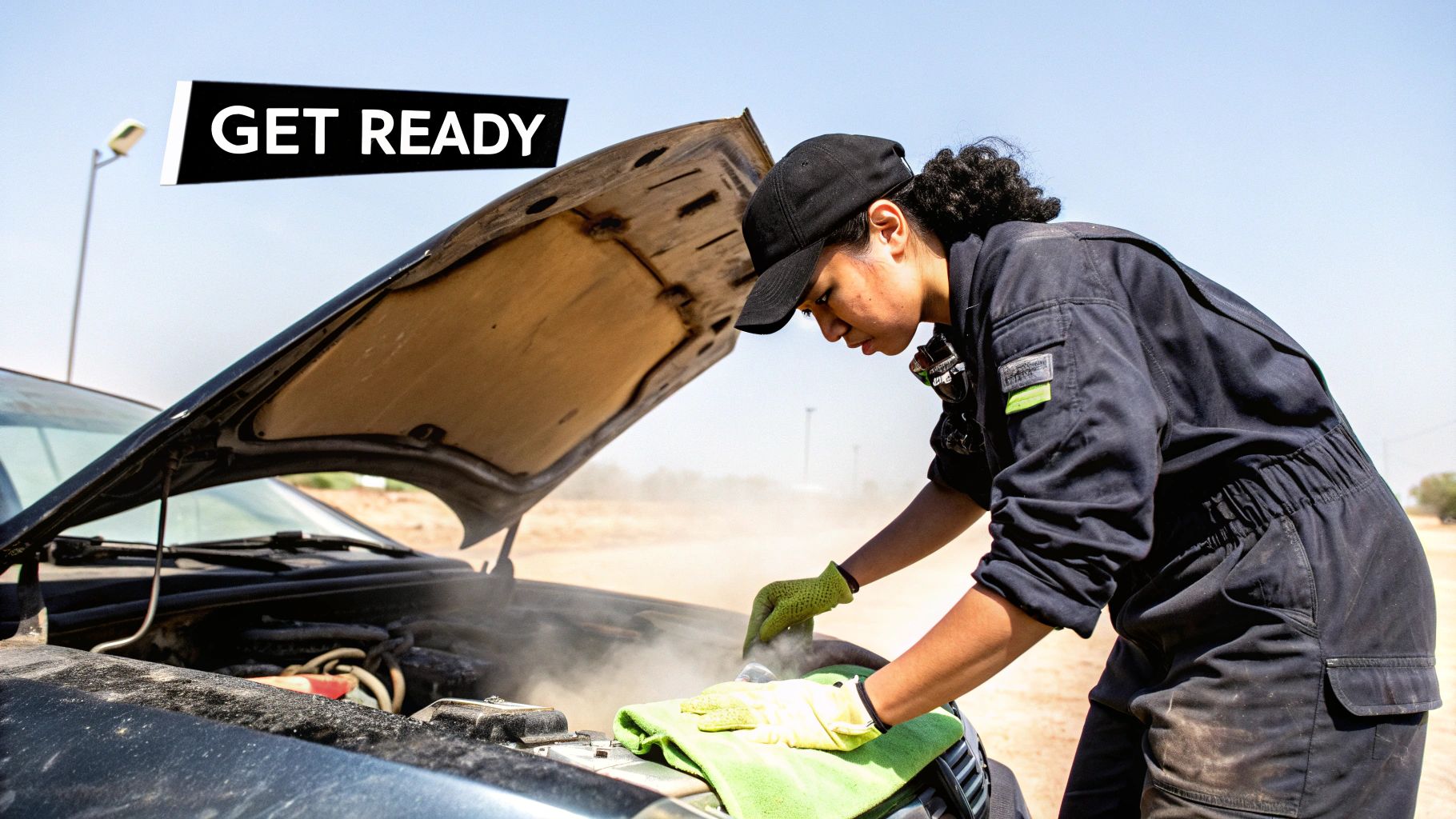
Knowing how scrap car prices are calculated is one thing, but actually getting top dollar for your old vehicle is another game entirely. With a bit of know-how, you can confidently steer the process and make sure you walk away with the most cash possible.
If you take only one piece of advice, make it this: always get multiple quotes. It’s the biggest mistake people make. They take the first offer and potentially leave hundreds of dollars behind. I always tell people to get at least three different valuations from reputable car buyers around Adelaide. It gives you a real feel for the market and some solid ground to stand on when you negotiate.
Set Yourself Up for Success
A little bit of prep work before you pick up the phone can make a huge difference. Getting your documents sorted shows you’re serious and makes the whole transaction a lot smoother.
- Proof of Ownership: You'll need the car's title or original registration papers. This is non-negotiable proof that you're the legal owner.
- Personal Identification: Have your driver's licence handy. It’s the standard way to verify who you are.
- Clear the Car: Make sure you've removed every last personal item. Check the glovebox, under the seats, and in the boot. Once that car is towed, you're not getting those things back.
Honestly, just having this stuff ready signals to buyers that you're organised, which can lead to a much better experience all around.
Here's a pro tip: Never, ever pay for towing. A legitimate scrap car removal service, like Auto Removal Adelaide, will always include free vehicle collection in their offer. If someone tries to sting you with a towing fee, that's a massive red flag.
Finalising the Deal with Confidence
Once you've weighed up your offers and picked a winner, the rest is pretty simple. Just give them a call to confirm the price they quoted and lock in a pickup time that works for you.
When the tow truck arrives, the driver will do a quick check to make sure the car is as you described it. After that, it’s just a matter of signing the final paperwork. Payment should happen right then and there – usually in cash – before they even hook up the car.
By taking these few simple steps, you're in the driver's seat. You can sidestep the common traps and get the best possible return for your old car, turning a hassle into a simple way to free up space and get some cash in hand.
A Few Common Questions About Scrapping Your Car
Even with all this information, you might still have a few questions rattling around. That’s perfectly normal. Let's tackle some of the most common things people ask us when they're looking to sell their scrap car in Adelaide. Think of this as your final checklist before you make the call.
Getting these last few details straight will help you go into the sale feeling confident and ready to get the best price.
Do I Need Rego to Scrap My Car?
This is easily the question we hear most often. The short answer is no, your car doesn't need current registration or a roadworthy certificate (RWC) to be scrapped. Car removal companies are buying it for its metal and parts, not to be driven on the road, so the rego status doesn't matter.
What absolutely does matter, though, is proving you're the legal owner. This is a hard-and-fast rule. You'll need to show the vehicle's title or the original registration papers, plus a valid photo ID like a driver's licence. This is a crucial step that protects both you and the buyer, making sure everything is above board.
The most important paperwork is anything that proves ownership. While you don't need a current registration sticker on the window, no legitimate scrap yard can buy a car without confirming you have the right to sell it.
Is It Better to Sell Parts Myself Before Scrapping?
Ah, the classic dilemma. Should you get your hands dirty, pull the car apart, and sell the good bits yourself? On paper, yes, you can sometimes squeeze a bit more cash out of a car this way, especially if it has a high-demand engine, gearbox, or catalytic converter.
But let's be realistic. This path demands a serious amount of your time, the right tools for the job, and a good bit of mechanical know-how. Then you have to find separate buyers for every single component, which can drag on for weeks or even months. It's a real hassle.
For most people, the sheer convenience of selling the car whole is the winning ticket. A good scrap car buyer already knows what parts are valuable and will factor that into their offer. You get a fair price for the entire vehicle in one go, get paid on the spot, and have the car gone the same day. It's simply the quickest, most straightforward way to turn that old car into cash.
Ready to turn that old car into cash? Auto Removal Adelaide offers top dollar for unwanted vehicles, with instant payment and free towing across Adelaide. Get your free, no-obligation quote today!

